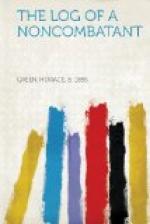“I do not know,” he said, as if thinking aloud; “I really do not know. America is the only country that has not fired on us yet, but all the rest —” Then he added thoughtfully, “Perhaps it is better that you go. But you cannot return to Ghent or Antwerp; you must go back to Germany.” He stopped as if he had gone too far, and then sharply commanded the orderly to remove us. Forty-eight hours later Mr. Van Hee got his release. To Luther and myself was given a curious sort of pass, beset with limitations, which at times caused us royal treatment and as often proved a fatal baggage tag. I have always believed a joker lay hidden somewhere in that document. It started with a flattering description of our status (as given by ourselves), but below it directed us to be taken into Aix-la-Chapelle, Germany, and under no circumstances to be returned within the Belgian lines. We had seen a great deal too much for that. In spite of our protestations of good faith and promises to keep dark what we had seen, the military authorities considered us much safer under German guard. We were to be taken on the southern route by way of Namur. To drive home the importance of obeying this order we were reminded of the regulation, printed in French and posted throughout the city, “that whosoever passed the city limits or approached the fighting line without military permit, or on the pretense of having such a permit, or whosoever deviated from the route laid down would be shot ‘sur le champ.’” That same evening, however, army orders declared that the Namur route was closed. We got a second War Office pass sending us to Aix by way of Louvain, Tirlemont, and Liege. Armed with these we went down to an old Major Bock von W------, in charge of transportation at Schaerbeek, on the outskirts of the city.
I showed him the passes and said with a painful attempt at levity, “Major, we can’t obey both of these, so we ’re going to get shot either way we go. If it is all the same to you I would rather die on your route.” To my great relief the old fellow laid back his gray head and emitted a series of long, loud Teuton laughs. He was the first German I had heard laugh and it did me good. I knew we were safe. On the understanding that the business was strictly confidential and that no other citizens or suspects were to know of it, he gave us a permit for the military trains. It had been the intention of the War Office to pack us under guard with the herds on one of those Government refugee trains. But to live and sleep with the soldiers as we were now to do, to see their marches, to absorb their uninformed and boastful talk, to study their guns, munitions, and equipment, was better than our highest hopes.




